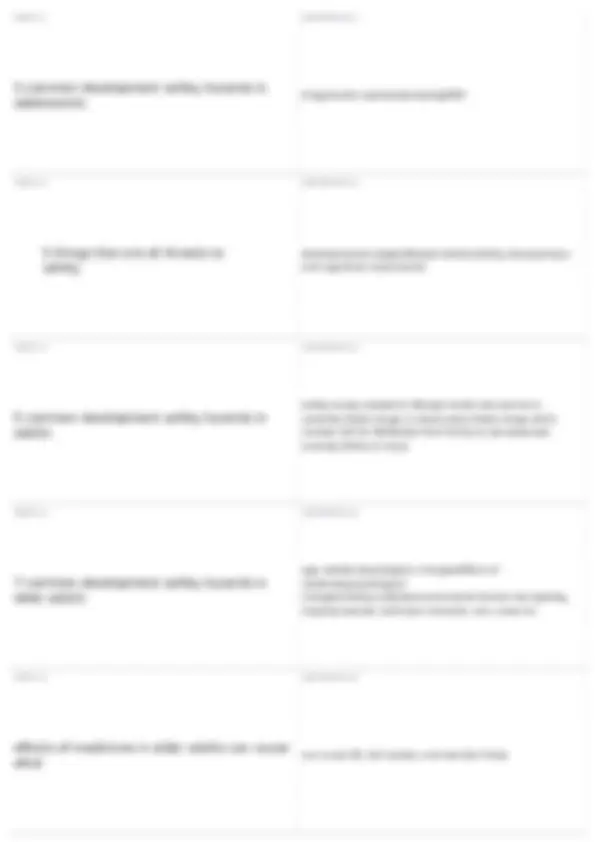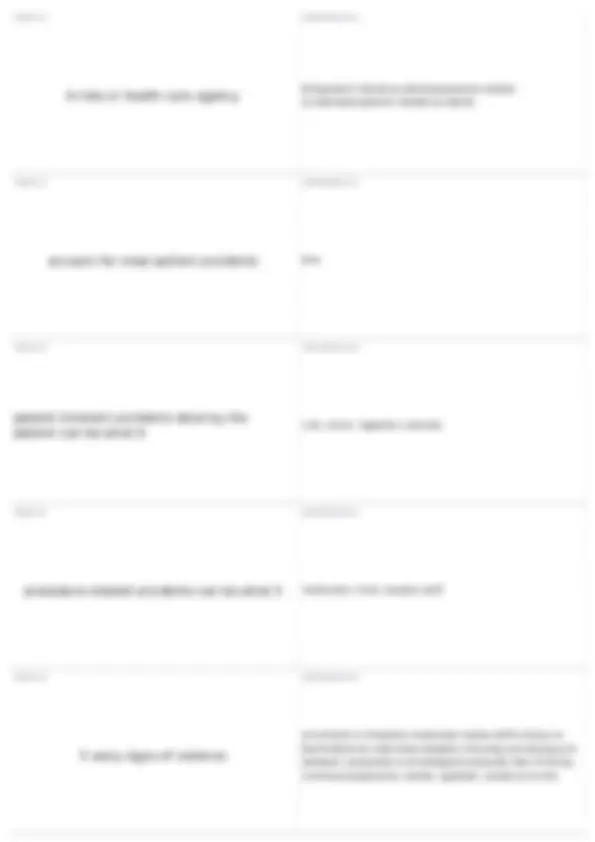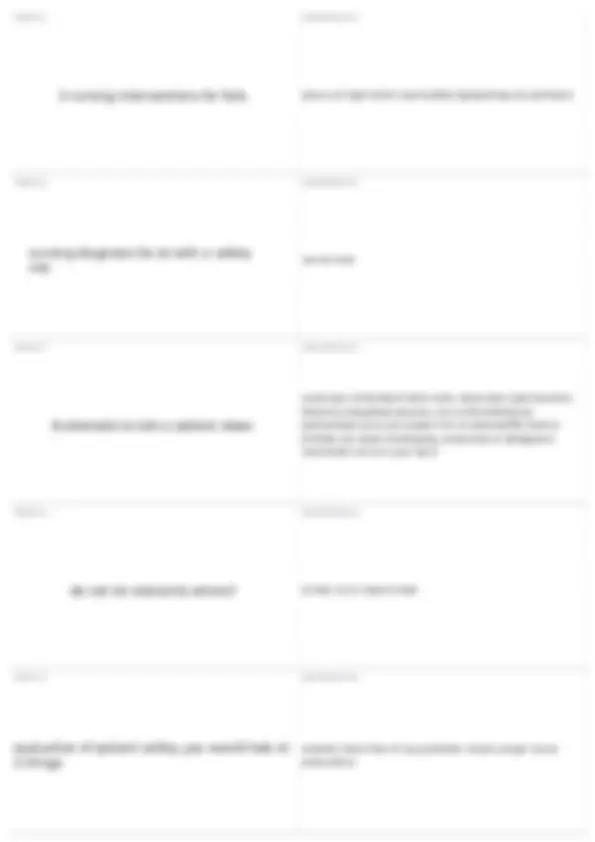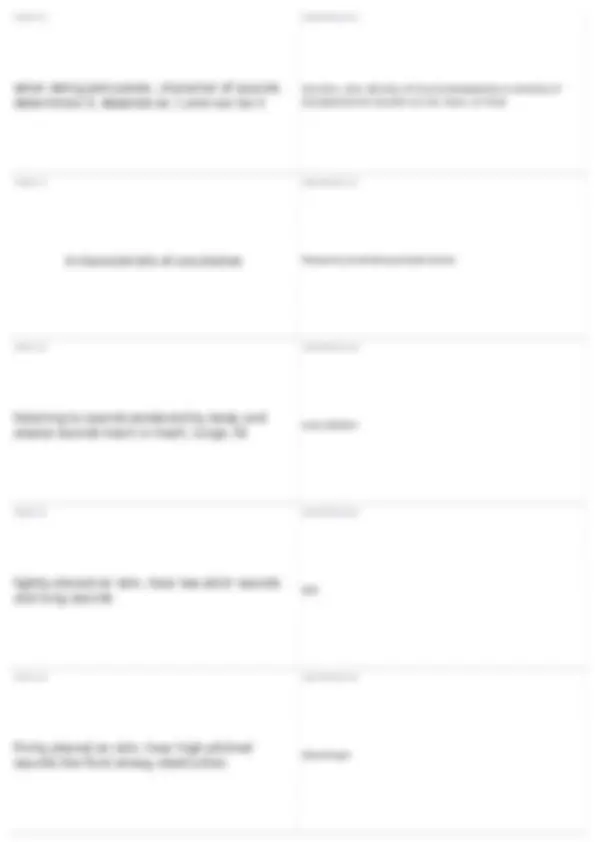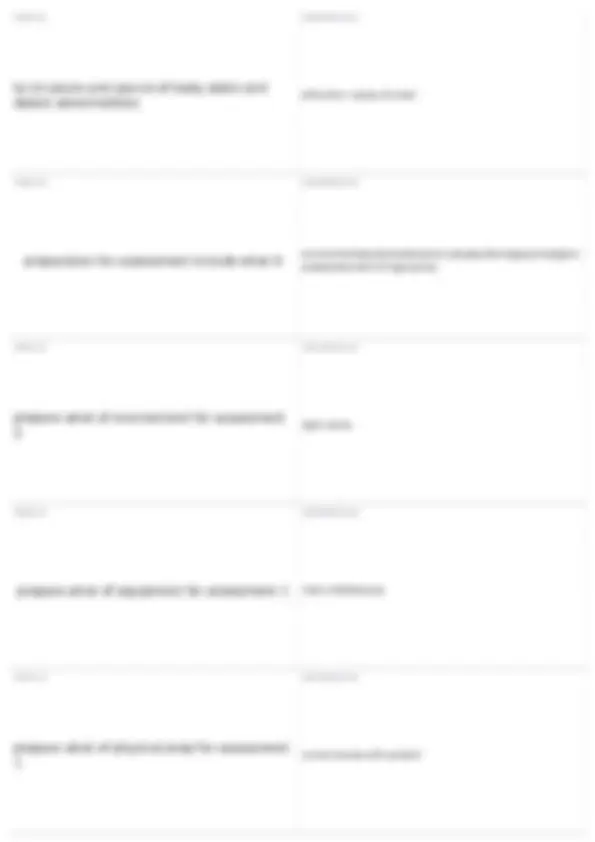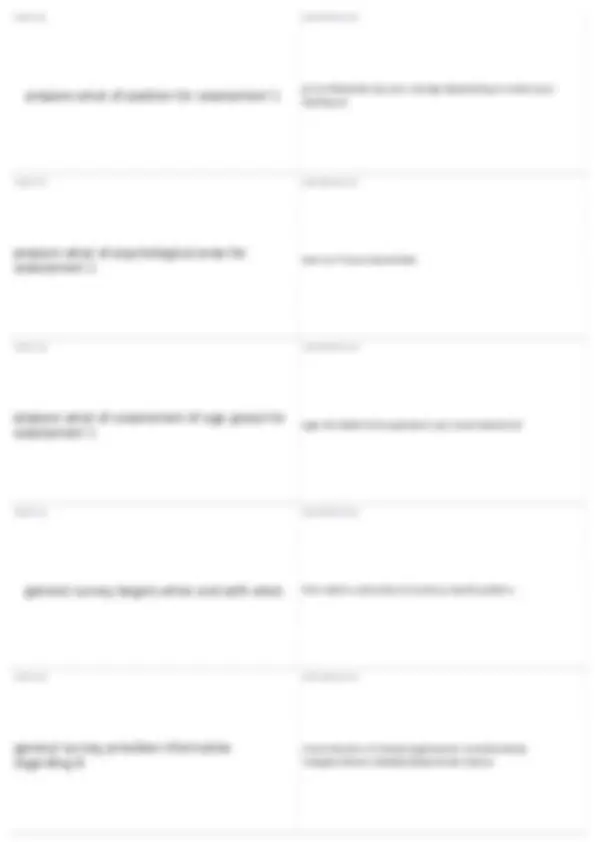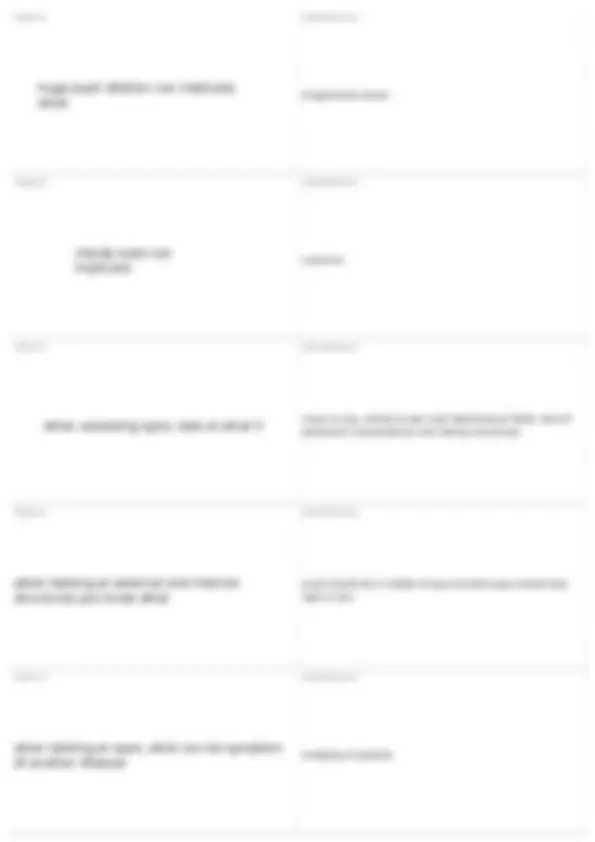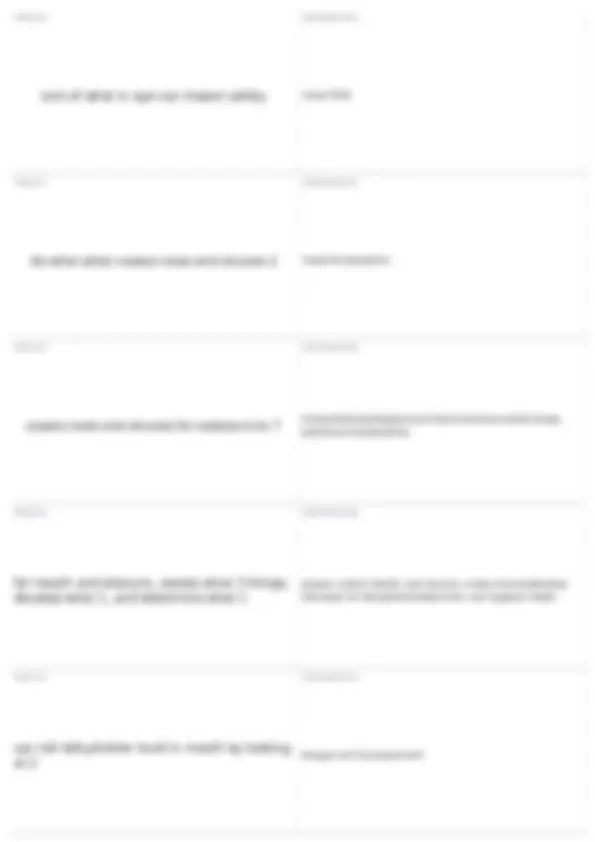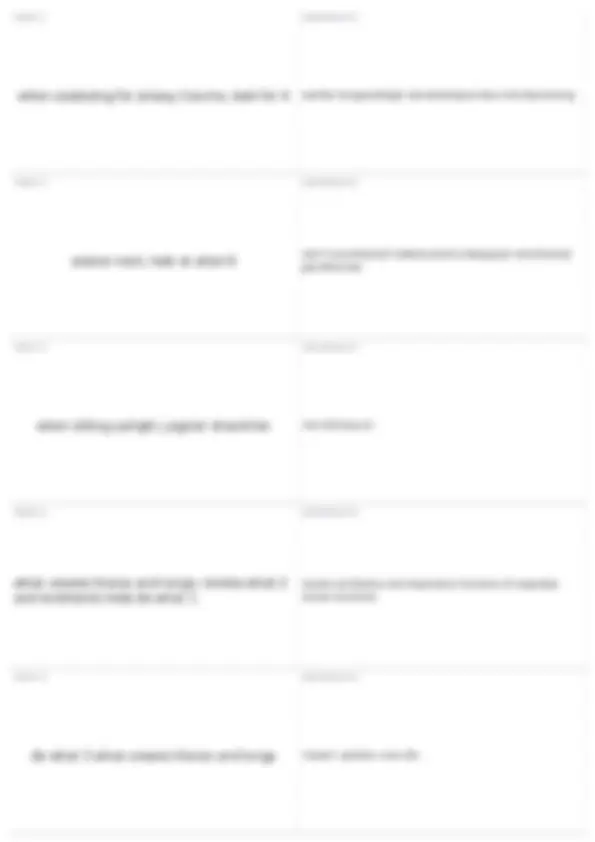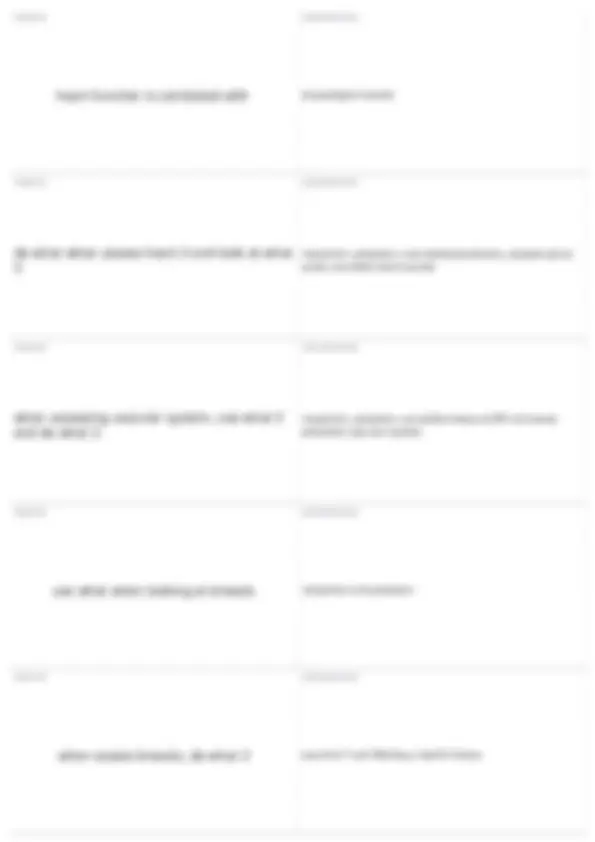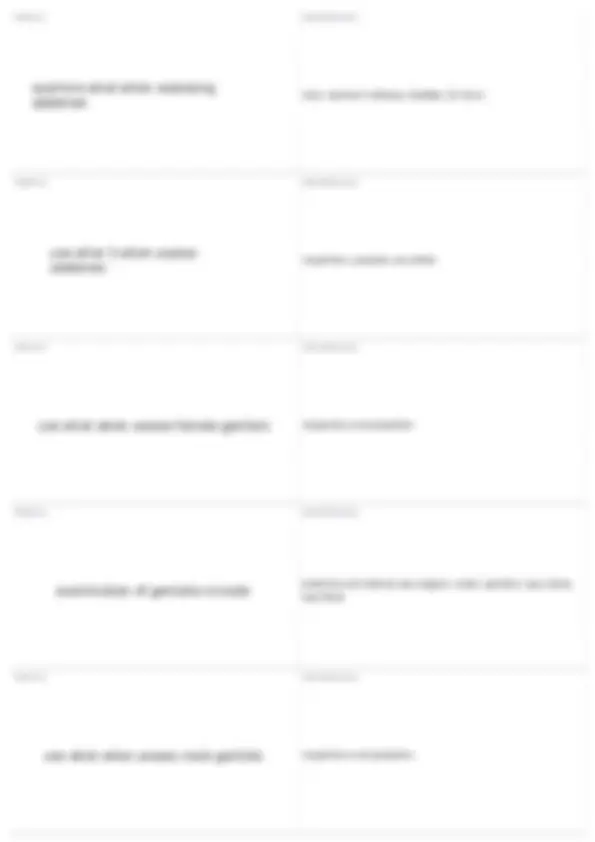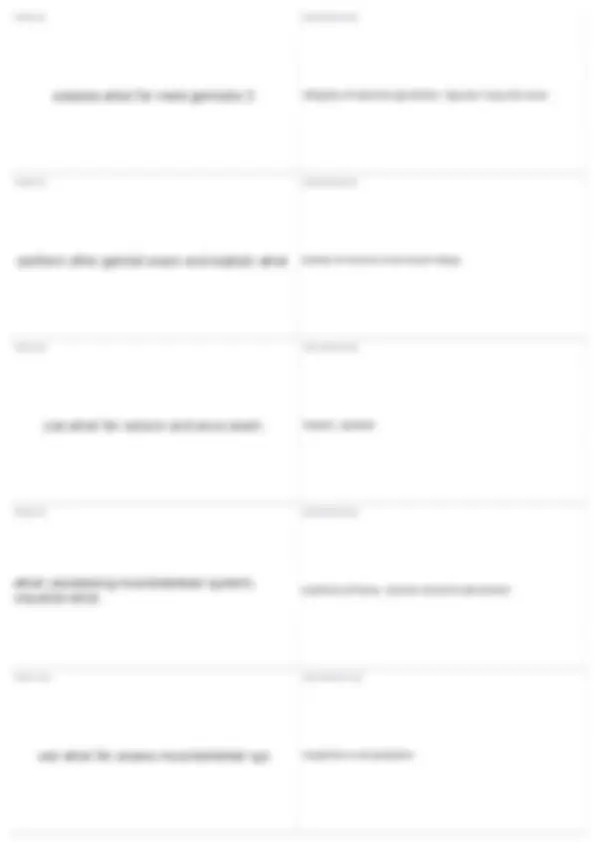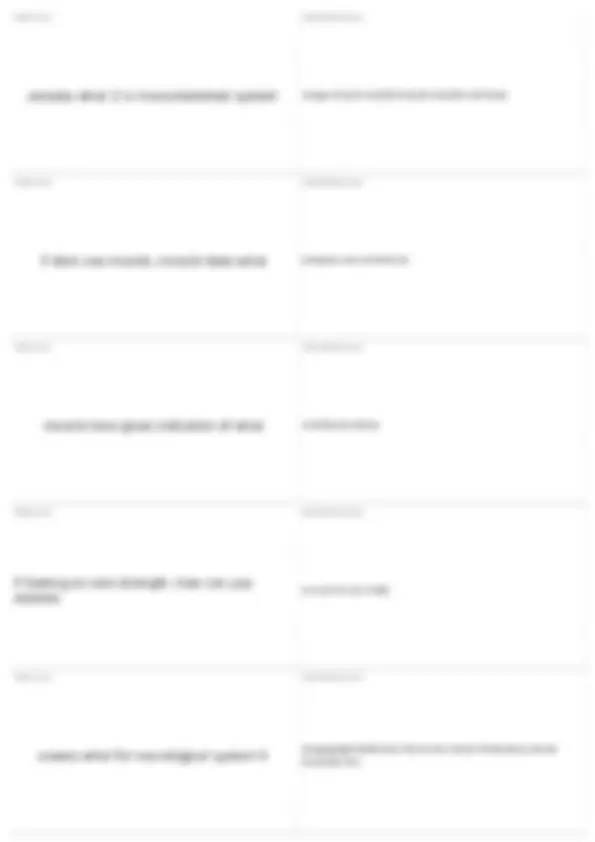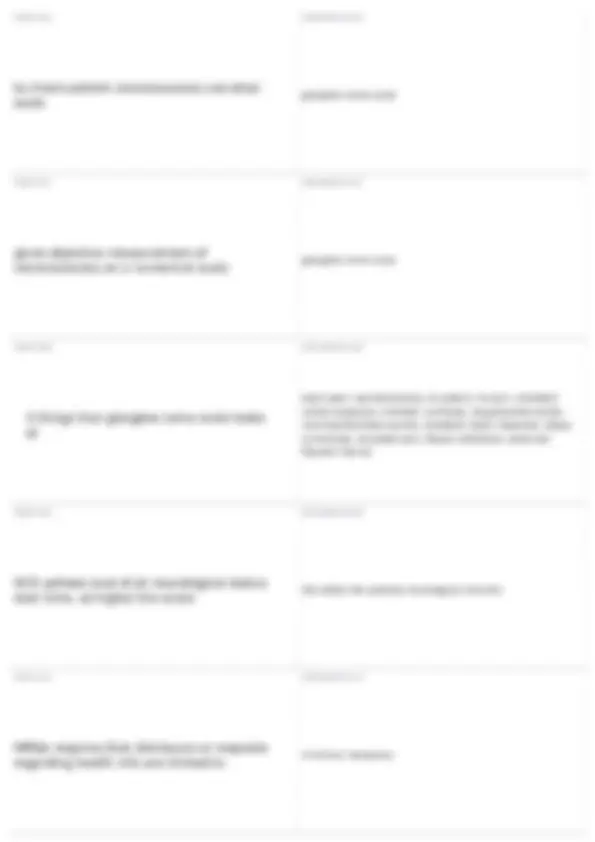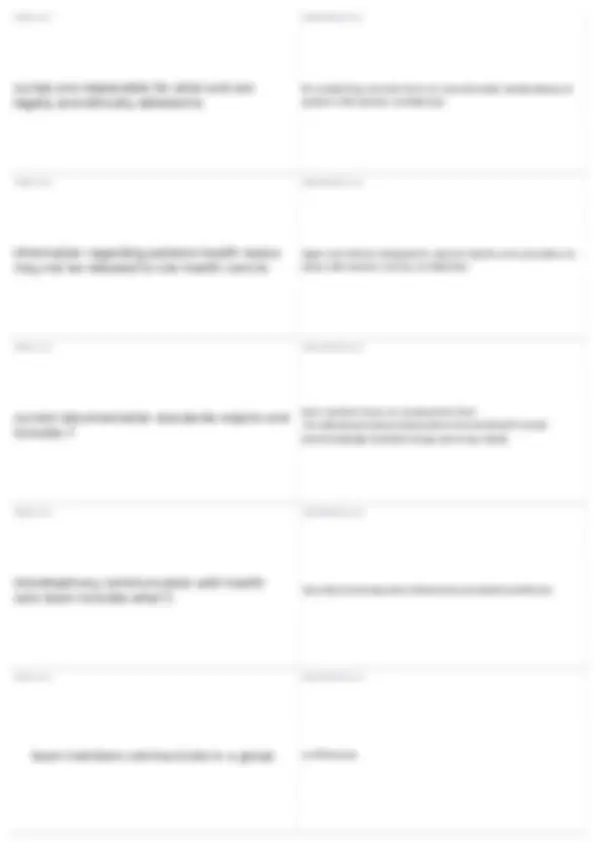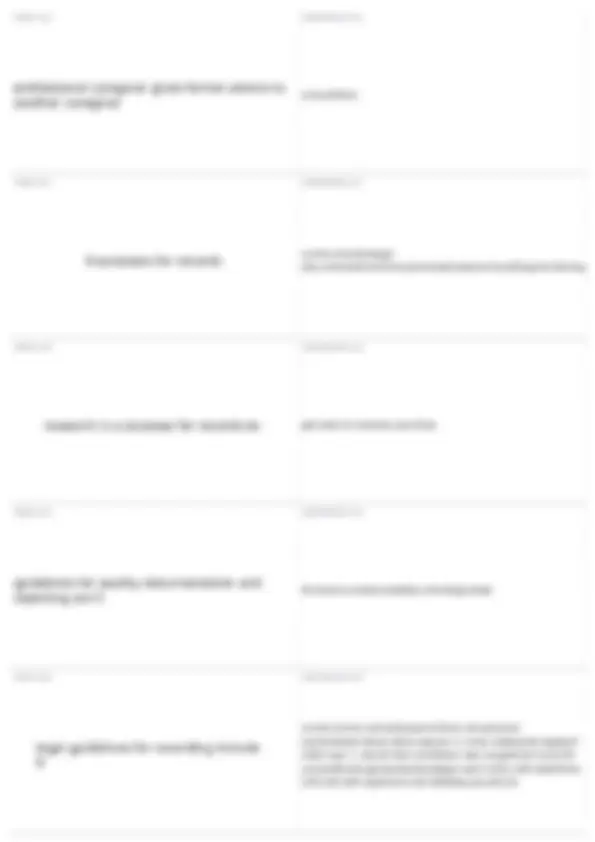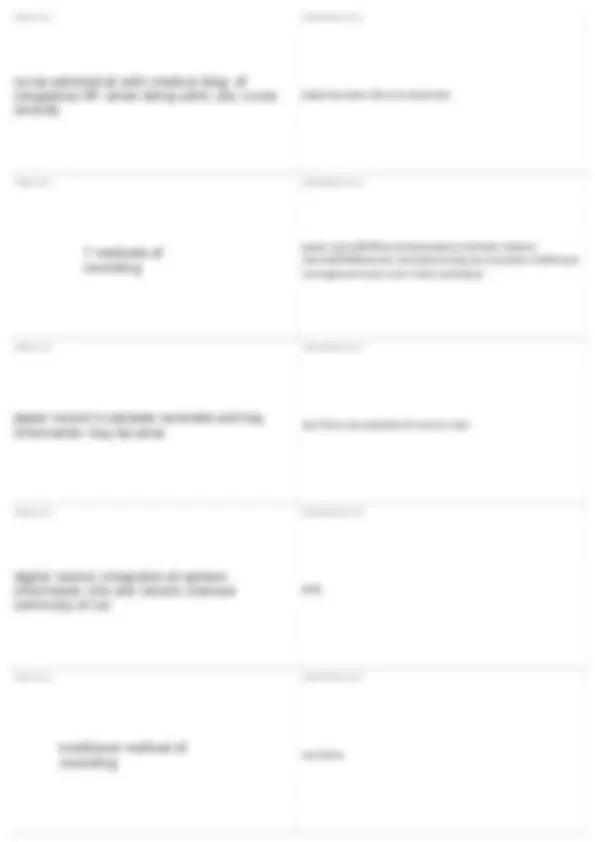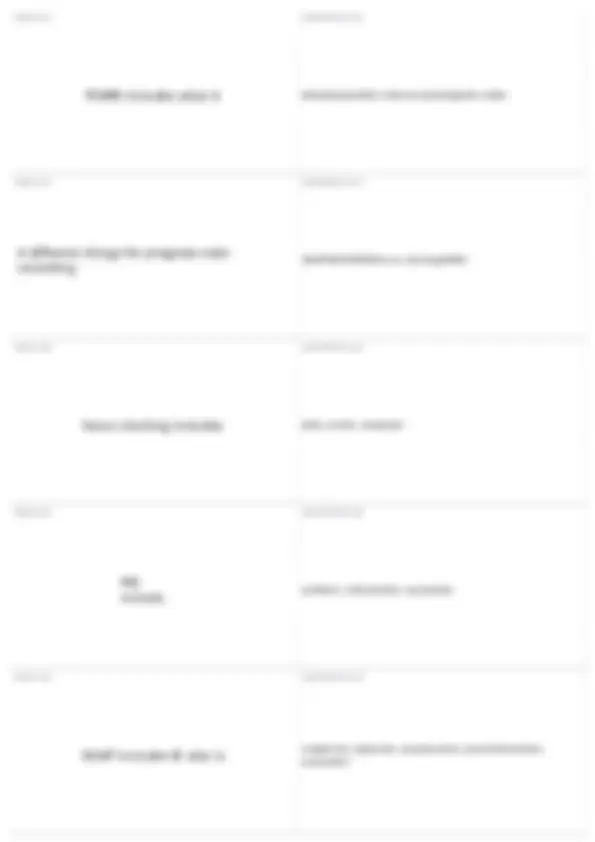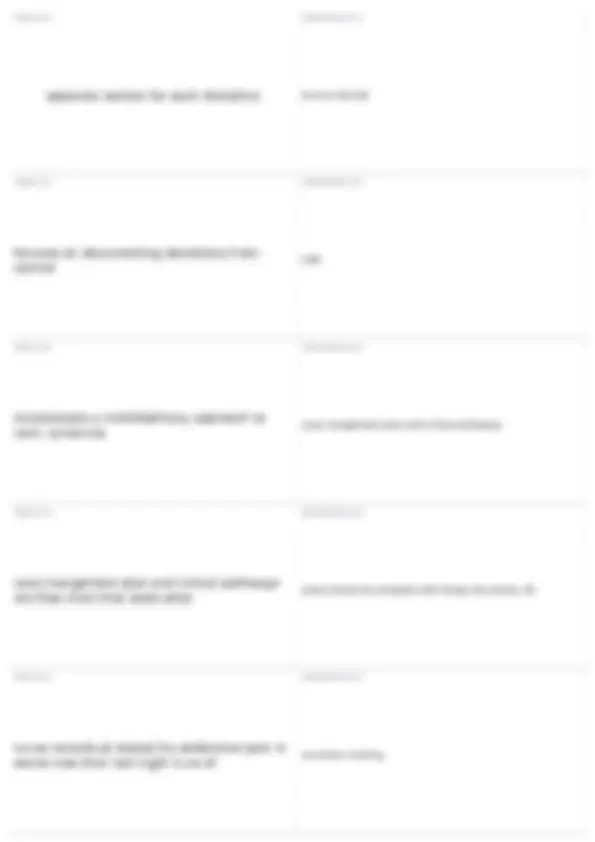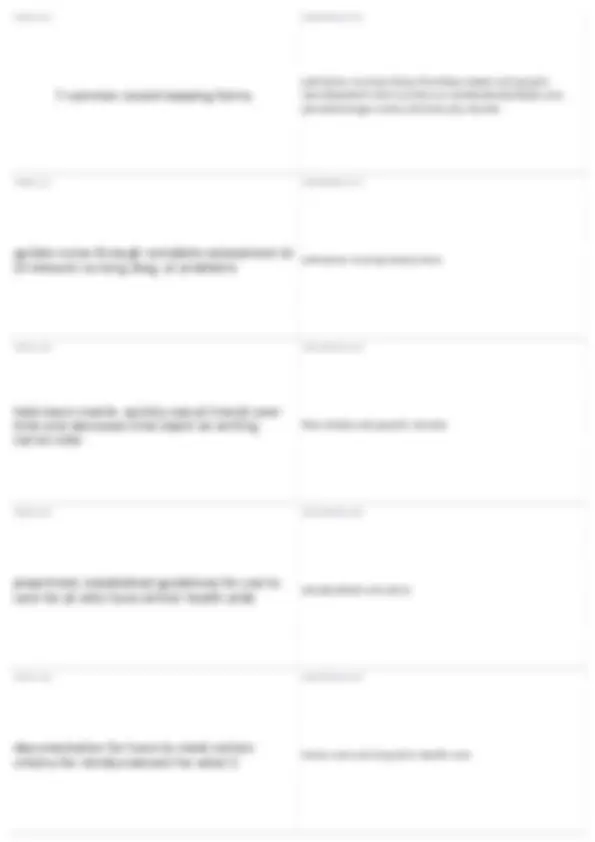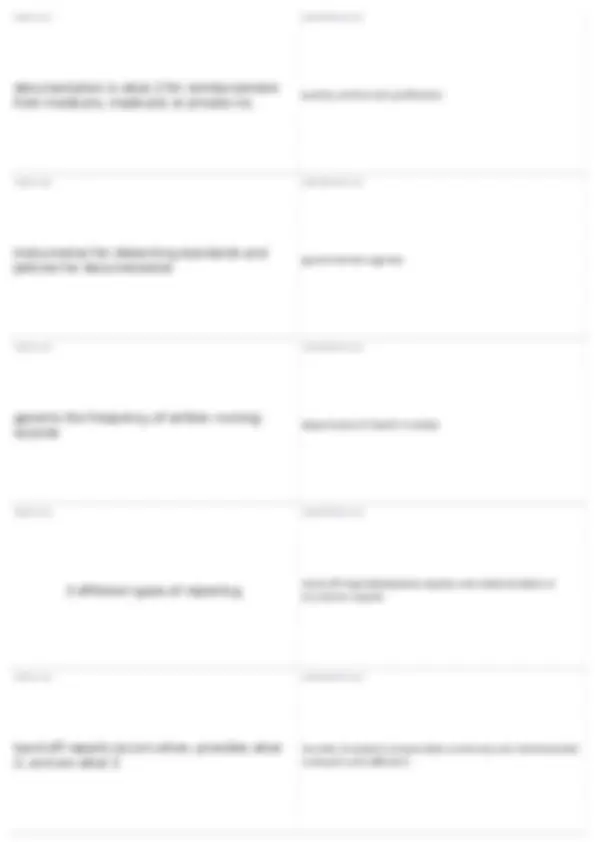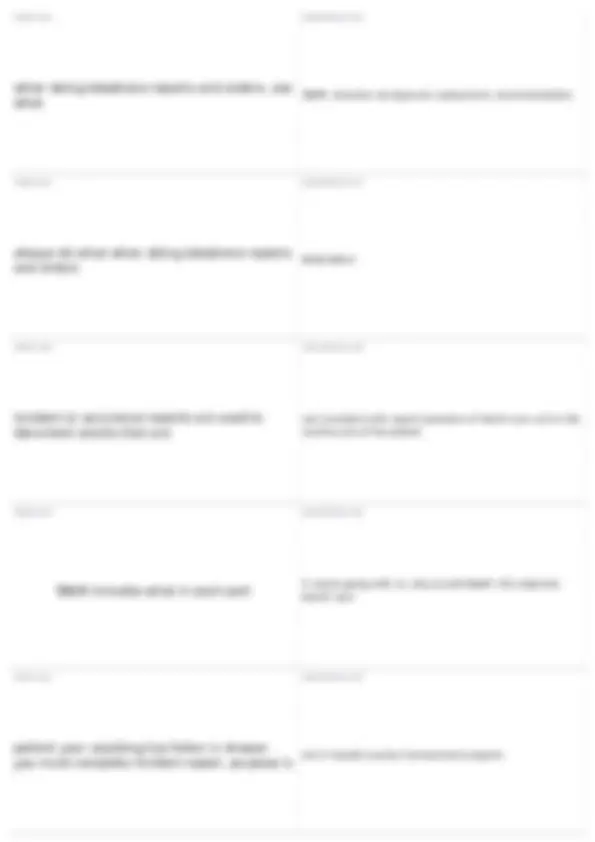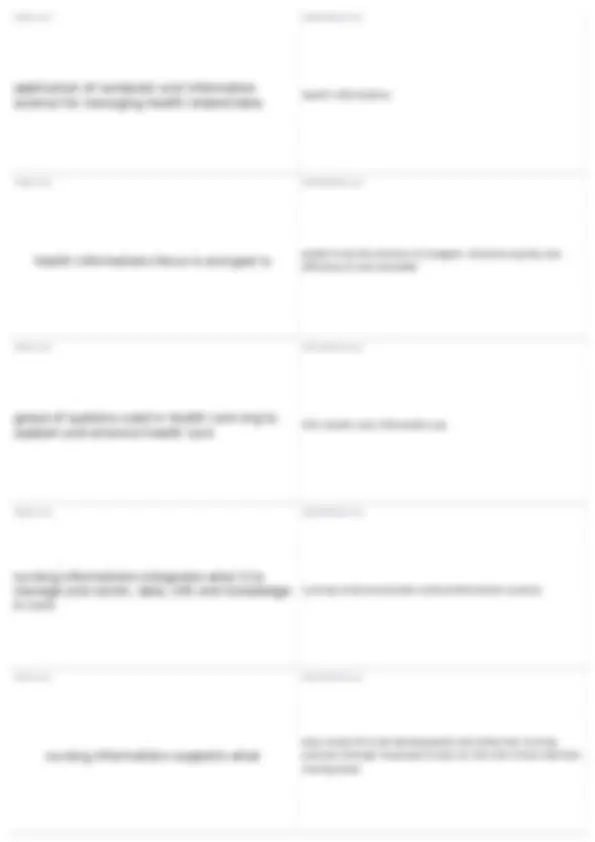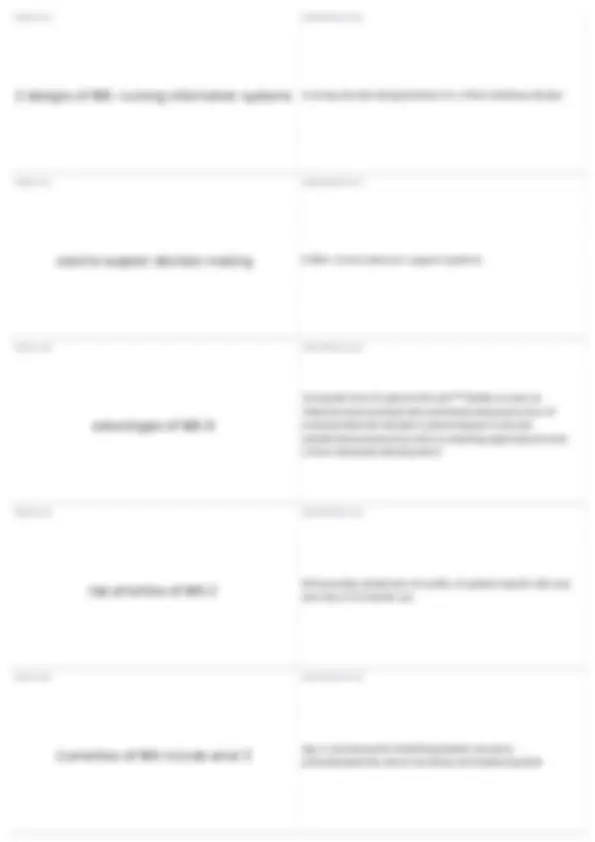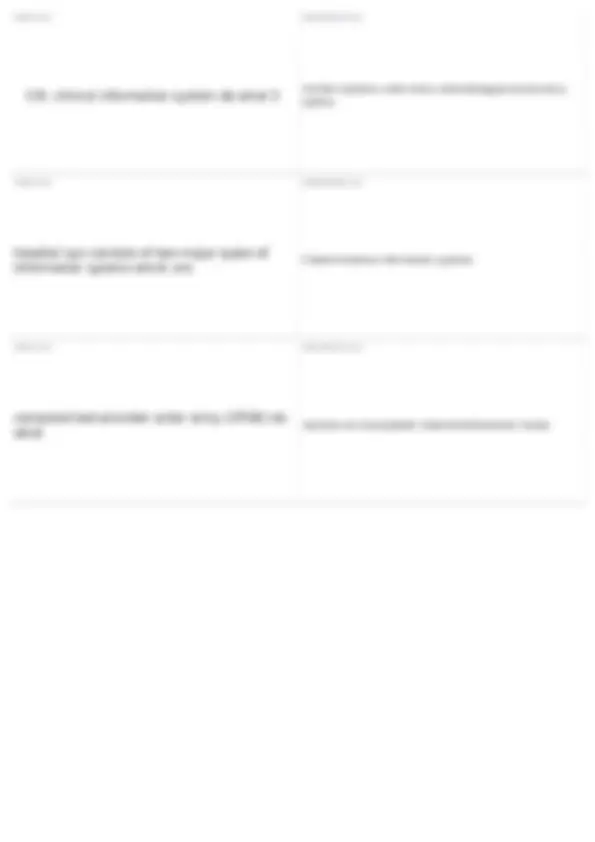Partial preview of the text
Download Health and Safety Terms and Definitions for Healthcare Professionals and more Quizzes Nursing in PDF only on Docsity!
Best place to take aprical HR
left of sterum, between 4th and 5th rib, midclavicular
TERM 2
tells us something is wrong with rhythm of
heart, ventricle not ejecting enough blood
DEFINITION 2
pulse deficit
TERM 3
1st response for seizure
DEFINITION 3
call for help
TERM 4
vulnerable groups like 3 req help to achieve a
safe environment
DEFINITION 4
elderly, hard of hearing, kids
TERM 5
4 basic human needs and describe for in
hospital
DEFINITION 5
oxygen- be alert for improper fxn eqipmentnutrtiion- proper
refrideration, food storage, food prep are essentialtemp-
comfort zone is 65-75, exposure to extreme cold and heat
can cause injuryhumidity- amount of water vapor in air, when
on o2, need degree of humidity
in home, inadequate lighting, physical
barriers are clutter are a what
risk for falling
TERM 7
4 other physical hazards
DEFINITION 7
poisonhome firenatural disasterthreat of bioterroist attack
TERM 8
6 pathogen tramission ways
DEFINITION 8
hand hygieneHIV- dirty needlesinsects and rodentsinadeq
human waste disposalimmunizationbiohazard waste
TERM 9
2 common development safety hazards in
infant, toddler, and preschooler
DEFINITION 9
prone to accidents, human preventabl;eparent edu
TERM 10
2 common development safety hazards in
school age child
DEFINITION 10
edu about safe playuse of safety equipment for sports
4 risks in health care agency
fallspatient inheret accidentsprocedure related
accidentsequipment related accidents
TERM 17
account for most patient accidents
DEFINITION 17
falls
TERM 18
patient inherent accidents done by the
patient can be what 4
DEFINITION 18
cuts, burns, ingestion, seizures
TERM 19
procedure related accidents can be what 3
DEFINITION 19
medication. fluid, hospital staff
TERM 20
5 early signs of violence
DEFINITION 20
pt exhibits or threatens violencept makes staff anxious or
fearfulbehavior alternates between shouting and dozing and
between cooperation and belligerenceexpress fear of losing
controluncooperative, hostile, agitated, unable to sit still
3 nursing interventions for falls
place call light within reachsafety lightpathway to bathroom
TERM 22
nursing diagnosis for pt with a safety
risk
DEFINITION 22
risk for falls
TERM 23
8 attempts to talk a patient down
DEFINITION 23
avoid eye contactdont block exits, leave door openmaintain
distance awayadopt passive, non confrontatational
posturetreat pt as you expect him to behaveoffer food or
drinkdo not make challenging, provactive or belligerent
remarksdo not turn your back
TERM 24
do not tie restraints where?
DEFINITION 24
to bed rail or head of bed
TERM 25
evaluation of patient safety you would look at
2 things
DEFINITION 25
whether there free of injurywhether known proper home
precautions
use of hands to examine accessible body
parts
palpation
TERM 32
when palpating skin, what are you doing 6
DEFINITION 32
look at temp, moisture, texture, turgor, tenderness and
thickness
TERM 33
palpating abdomen looks at what
DEFINITION 33
tenderness, distention, masses, size, softness
TERM 34
tapping body with fingertips to produce a
virbation
DEFINITION 34
percussion
TERM 35
when doing percussion, can document a large
organ with muffled sound and it says
DEFINITION 35
theres fluid that should not be there like air
when doing percussion, character of sounds
determines 3, depends on 1 and can be 3
location, size, density of structuresdepends on density of
tissueabnormal sounds can be mass, air fluid
TERM 37
4 characteristis of ascultation
DEFINITION 37
frequencyloudnessqualityduration
TERM 38
listening to sounds produced by body and
assess sounds heart in heart, lungs, GI
DEFINITION 38
auscultation
TERM 39
lightly placed on skin, hear low pitch sounds
and lung sounds
DEFINITION 39
bell
TERM 40
firmly placed on skin, hear high pitched
sounds like fluid airway obstruction
DEFINITION 40
diaphragm
prepare what of position for assessment 1
pt comfortable but you change depending on what your
looking at
TERM 47
prepare what of psychological prep for
assessment 1
DEFINITION 47
look at if have disabilities
TERM 48
prepare what of assessment of age group for
assessment 1
DEFINITION 48
age will determine approach you have toward pt
TERM 49
general survey begins when and with what
DEFINITION 49
first meet a ptreview of primary health pattern
TERM 50
general survey provides information
regarding 6
DEFINITION 50
characteristic of illnesshygieneskin conditionbody
imageemtional statedevelopmental status
when looking at general appearance and
behavior look at what 14
gender and race hygiene and groomingsigns of distress body
odorposition speechbody movements subculture
absedressaffect and moodpatient abuseagebody typegait
TERM 52
example of subculture abuse
DEFINITION 52
family not taking care of patient, family taking away money
or assests from patient
TERM 53
when assessing and taking nursing history of
skin, look at what 8
DEFINITION 53
colormoisturetemptextureturgorvascularityedemalesions
TERM 54
Hair and scalp- use inspection and assess
what 4
DEFINITION 54
distributionthicknesstexturelubrication
TERM 55
Nails- use what
DEFINITION 55
inspection and palpation
huge pupil dilation can implicate
what
drug/alochol abuse
TERM 62
cloudy eyes can
implicate
DEFINITION 62
cataracts
TERM 63
when assessing eyes, look at what 3
DEFINITION 63
visual acuity- ability to see small detailsvisual fields- test of
perpherial visionexternal and internal structures
TERM 64
when looking at external and internal
structures you know what
DEFINITION 64
pupil should be in middle of eye and both eyes should look
right at you
TERM 65
when looking at eyes, what can be symptom
of another disease
DEFINITION 65
buldging of eyeballs
lack of what in eye can impact safety
visual field
TERM 67
do what when assess nose and sinuses 2
DEFINITION 67
inspectionpalpation
TERM 68
assess nose and sinuses for exposure to 7
DEFINITION 68
dustpollatantsallergiesnasal obstructiontraumadischarge,
postnasal dripheadches
TERM 69
for mouth and pharynx, assess what 3 things,
develop what 1, and determine what 1
DEFINITION 69
assess- overall health, oral trauma, airway traumadevelop-
therapies for dehydrationdetermine- oral hygiene needs
TERM 70
can tell dehydration level in mouth by looking
at 2
DEFINITION 70
tongue and lip assessment
inspect, palpate, ausculte what 4 in thorax
and lungs
orthopneadyspneaadventitious breath soundsnormal breath
sounds
TERM 77
what part of lung can indicate a problem
DEFINITION 77
lowest part
TERM 78
4 breath sounds problems
DEFINITION 78
cracklesrhonchiwheezepleural rub
TERM 79
disruption of air passing thru small airways,
not cleared with coughing, fluid overload
DEFINITION 79
crackles
TERM 80
loud low pitched rumbling sound, indicates
fluid or mucous buildup= atelectesis,
pneomia
DEFINITION 80
rhonchi
air flow thru narrowed airway, inspiration =
air obstruction, expiration ususally
wheeze
TERM 82
what kind of wheezing is worse and why
DEFINITION 82
inspitory bc something is blocking you from getting air in
TERM 83
example of expiratory wheezing
DEFINITION 83
astham
TERM 84
rubbing against each other, sounds like 2
pieces of rubber grating
DEFINITION 84
pleural rub
TERM 85
compare assessment of heart function with
what
DEFINITION 85
findings from vascular assessment
examine what when assessing
abdomen
liver, stomach kidneys, bladder, GI tract
TERM 92
use what 3 when assess
abdomen
DEFINITION 92
inspection, palpate, ascultate
TERM 93
use what when assess female genitals
DEFINITION 93
inspection and palpation
TERM 94
examination of genitalia include
DEFINITION 94
external and internal sex organs- smell, position, way looks,
way feels
TERM 95
use what when assess male gentials
DEFINITION 95
inspection and palpation
asssess what for male genitalia 3
integrity of external genitalias, inguinal ring and canal
TERM 97
perform after gential exam and explain what
DEFINITION 97
assess of rectum and anusall steps
TERM 98
use what for rectum and anus exam
DEFINITION 98
inspect, palpate
TERM 99
when asssessing musclosketeal system,
visualize what
DEFINITION 99
anatomy of bone, muscle and joint placement
TERM 100
use what for assess musclosketeal sys
DEFINITION 100
inspection and palpation

